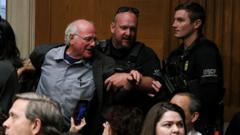During a Senate protest, Ben Cohen, co-founder of Ben & Jerry's, was arrested for disrupting a session focused on military assistance to Israel while advocating for Gaza. His arrest reflects the ongoing intersection of corporate activism and political discourse surrounding humanitarian issues.
Ben & Jerry's Co-Founder Detained During Senate Protest on Gaza Aid

Ben & Jerry's Co-Founder Detained During Senate Protest on Gaza Aid
Ben Cohen arrested at a Senate hearing, calling attention to military aid to Israel amidst Gaza humanitarian conditions.
Ben Cohen, the co-founder of the ice cream brand Ben & Jerry's, found himself in police custody following a protest at the U.S. Senate focused on military support for Israel amid the dire humanitarian conditions in Gaza. The protest occurred during a hearing on Wednesday, where Health and Human Services Secretary Robert F. Kennedy Jr. was giving testimony.
Capitol Police reported that Cohen, along with six other demonstrators, faced charges related to civil disobedience, including misdemeanour charges of crowding, obstructing, or incommoding. Video footage revealed the co-founder being escorted from the building, visibly protesting against what he described as Congress's role in perpetuating violence against children in Gaza while simultaneously reducing Medicaid services in the U.S.
"This isn’t just about ice cream; it’s about staring down the realities of our government’s actions," Cohen stated in a video message after the incident. While he was charged with a misdemeanour, the other protesters faced more serious charges, such as assaulting a police officer or resisting arrest.
Notoriously vocal about social and political issues, Ben & Jerry's has a history of activism since its establishment in 1978. The company, acquired by Unilever in 2000, has maintained an independent board to uphold its values despite occasional friction with its parent company. Recently, tensions have mounted over Ben & Jerry’s decision to halt sales in the West Bank and subsequent legal disputes over perceived political activism, including claims that Unilever dismissed their CEO due to disagreements over the brand's stance on social issues.
A representative from Unilever clarified that Cohen’s actions were personal and not reflective of the corporate policy, stating, “Ben Cohen takes stances as an activist citizen on issues he finds personally important.” The statement indicates a growing rift between corporate priorities and individual activist impulses within the company as it seeks to navigate the contentious political landscape surrounding the Israel-Gaza conflict.




















